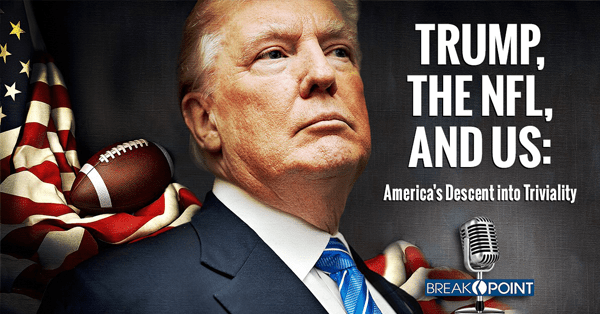Podcast: Play in new window | Download
Subscribe: RSS

Trump, the NFL, and Us – America’s Descent into Triviality
Could it be that our fascination with the story is more important than the story itself? President Trump, the NFL, and us.
Last week was a week full of headlines. On Wednesday, the president, speaking before the United Nations, said that if the U.S. “is forced to defend itself or its allies, we will have no choice but to totally destroy North Korea.”
Later that day, Hurricane Maria crossed Puerto Rico from southeast to northwest, dropping upwards of forty inches of rain, including fourteen inches in a two-hour period, which may be a world record nobody wants to own. More than three million American citizens were left without power or water, and face a humanitarian crisis.
Oh, and somewhere in there was another failed attempt to repeal and replace Obamacare.
But by the weekend, the story that most Americans seemed to care about was a feud between the president and professional athletes.
By now, you undoubtedly know more than you need to know about that feud—I mean that literally—and I don’t want to contribute to a problem I’m about to decry. So for details, I’ll direct your attention to a fine piece by David French in the National Review.
But we’re still left with the question about why this discussion is consuming so much of our national attention when there are issues far more deserving that we are increasingly disinclined to care about.
I suggest the reason was the subject of a 1985 book called “Amusing Ourselves to Death,” by the late Neil Postman. Postman, the founder of New York University’s Media Ecology program, wrote about our culture’s “vast descent into triviality.”
Comparing George Orwell’s “1984” and Aldous Huxley’s “Brave New World,” Postman concluded that Huxley had proved to be more prophetic. Whereas “Orwell feared those who would deprive us of information, Huxley feared those who would give us so much that we would be reduced to passivity and egoism.”
Whereas “Orwell feared that the truth would be concealed from us, Huxley feared the truth would be drowned in a sea of irrelevance. Orwell feared we would become a captive culture. Huxley feared we would become a trivial culture.”
The consequences of becoming the sort of culture Huxley predicted was on full display this weekend. Namely, as Postman warned, by caring about things that aren’t important, while being distracted from things that truly are important.
We live in an age where the phrase “Instagram celebrity” can be said with a straight face. Historian Daniel Boorstin’s definition of a celebrity—“someone who is well-known for his well-knownness”—is now truer than ever. In such a culture, as Postman forewarned, being popular is confused with being important.
As Bill Brown, Senior Fellow for Worldview and Culture at the Colson Center has long said, “In other times and places, heroes made history. In our time and place, they make CD’s and touchdowns.” And yet, we are the people who know their lyrics and stats better than our own national history or Constitution. We can name the judges of “The Voice,” but not those on the Supreme Court.
Postman also worried that our desire for entertainment and distraction would rob us of our ability to think critically or to even think for ourselves at all.
Here’s a case in point: David French rightly asked how many people yelling ‘free speech’ for athletes are only too happy to sic the government on the tiny few bakers or florists who don’t want to use their artistic talents to celebrate events they find offensive?”
It is amazing just how prophetic Postman has proven to be, even though he was writing years before Internet or social media, and only a few years after cable television. He knew we were embracing self-destructive habits of the soul, and he tried to warn us.
But listening is not nearly as amusing as a Twitter war, and requires much more sustained attention than watching a football game.
Lord, have mercy on us all!
Trump, the NFL, and Us: America’s Descent into Triviality
Postman’s insight on our culture’s ability to idolize the trivial and gloss over the important is a wake-up call that reverberates even in the Body of Christ. Pray that we recognize the difference between the insignificant and the significant, between the temporary and the eternal.
Visit Breakpoint.org to get further information about the many great books and other resources available there and you can link up to our social media sites like Facebook and Twitter.
By Colson Center for Christian Worldview. Discovered by Christian Podcast Central and our community — copyright is owned by the publisher, not Christian Podcast Central, and audio is streamed directly from their servers.
Resources
- Amusing Ourselves to Death: Public Discourse in the Age of Show Business
- Neil Postman | Penguin Books | 1985